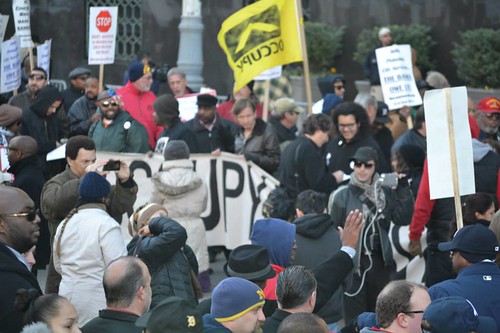
Crowds took over the streets in Detroit demanding that the banks be held accountable for the financial ruin of the city. "Make the Banks Pay" the people chanted., a photo by Pan-African News Wire File Photos on Flickr.
http://www.businessweek.com/news/2014-01-16/detroit-loses-bid-to-pay-banks-165-million-to-end-swaps
Detroit Judge Rejects $165 Million Swaps Deal as Too Costly
By Steven Raphael and Steven Church January 17, 2014
A Detroit bankruptcy judge rejected as too costly a proposal by the city to pay UBS AG (UBSN) and Bank of America Corp.
(BAC:US) about $165 million to end interest-rate swaps that have cost taxpayers $202 million since 2009.
U.S. Bankruptcy Judge Steven Rhodes yesterday called the settlement “too high a price” and advised Detroit to seek better terms. “The court will not let the city continue hasty decisions,” he said.
The decision is a setback for Kevyn Orr, Detroit’s emergency financial manager, who is trying to adjust about $18 billion in municipal debt in a matter of months. The city can try to reach a new deal with the banks or sue them to void the contracts, an option that some creditors said should have been considered more seriously in the first place.
“There’s now a dispute that needs to be resolved, and if it’s not going to be settled, then there’s likely to be litigation,” Mark Berman, a bankruptcy lawyer not involved in the case, said in an e-mail. “That usually means delay and expense.”
Under the 2009 swaps agreement, the banks have the right to seek control of Detroit’s casino taxes, which the city pledged as collateral. To prevent the banks from seizing the money, Orr may need to file an emergency motion with the court.
The city had asked the judge to approve a $285 million loan to pay for the swaps settlement and other projects. Rhodes yesterday allowed it to borrow only $120 million, which is to be used to improve city services.
Pension Obligation
The swaps are tied to pension obligation bonds issued in 2005 and 2006. They were designed to protect against rising interest rates by requiring the banks to pay the city if rates rose above a certain level. When rates fell, Detroit was required to make monthly payments.
“We are thankful the court has approved our ability to pursue quality-of-life financing for the benefit of the city’s 700,000 residents,” Orr said in a statement yesterday. “As recommended, we will continue to work toward a resolution of the pension swaps.”
Bill Halldin, a spokesman for Bank of America, and Megan Stinson of UBS declined to comment on the ruling.
Detroit filed a record $18 billion municipal bankruptcy in July, saying decades of economic decline had left it without enough money to pay creditors and still provide basic services.
Earlier Deal
Days before filing, it reached a deal to pay $230 million to terminate the swaps contracts, which a city service corporation signed with Zurich-based UBS and SBS Financial Products Co. Merrill Lynch, a unit of Charlotte, North Carolina-based Bank of America (BAC:US), took over the SBS position in July.
The banks argued in court papers that their swaps claims are protected by what’s known as the safe-harbor provision of the U.S. Bankruptcy Code. That rule makes it easier for some kinds of collateral to be seized by creditors, even when a debtor is in bankruptcy.
The city wanted to buy out the swaps to avoid the risk of a lawsuit and to keep the casino taxes, one of its best sources of revenue, from being threatened by UBS and Bank of America.
Rhodes suspended a December trial over the $230 million settlement and told the city to renegotiate. On Dec. 24, Detroit announced a new deal that reduced the termination payment to $165 million.
Creditors led by bond insurer Syncora Guarantee Inc. opposed the settlement. The city didn’t prove it would lose if it sued to cancel the swaps contracts instead of settling with the banks, Syncora said.
Bonds Fall
The city’s five percent sewer bonds that mature in 2025 fell almost 3 percent to 85.57 cents on the dollar after yesterday’s ruling, according to data compiled by Bloomberg.
Rhodes’s decision is “stunning and extraordinary,” said Lee Bogdanoff, one of the lead lawyers in Jefferson County, Alabama’s $4 billion bankruptcy.
In municipal bankruptcies, judges have limited power over the decisions of civic officials, Bogdanoff said in a phone interview yesterday. Judges generally defer to the business judgment of a debtor’s managers about whether to settle a legal dispute, he said. A mediator appointed by Rhodes had recommended approving the settlement.
“In the short run, you are going to have more litigation,” Bogdanoff said. It’s too early to tell whether that would make it harder for the city to win support from creditors for a plan to adjust its debts, he said.
The case is In re City of Detroit (9845MF:US), 13-bk-53846, U.S. Bankruptcy Court, Eastern District of Michigan (Detroit).
To contact the reporters on this story: Steven Raphael in federal court in Detroit at sraphael5@bloomberg.net; Steven Church in Wilmington, Delaware, at schurch3@bloomberg.net
To contact the editor responsible for this story: Andrew Dunn at adunn8@bloomberg.net
No comments:
Post a Comment